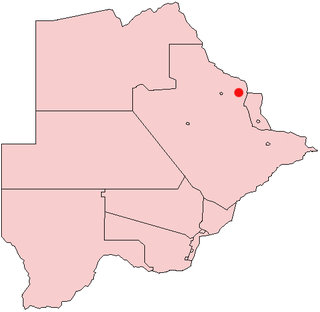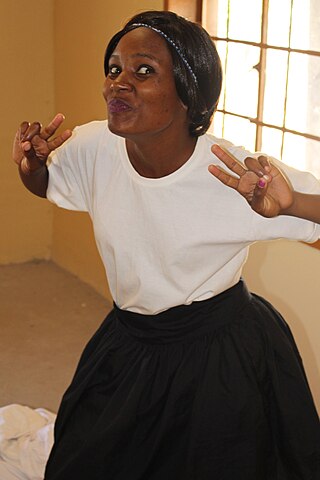Kalanga may refer to:
Kalanga may refer to:

Demographic features of the population of Zimbabwe include population density, ethnicity, education level, health of the populace, economic status, religious affiliations and other aspects of the population.
Kalanga, or TjiKalanga, is a Bantu language spoken by the Kalanga people in Botswana and Zimbabwe. It has an extensive phoneme inventory, which includes palatalised, velarised, aspirated and breathy-voiced consonants, as well as whistled sibilants.
KCK is a popular name of Kansas City, Kansas, to differentiate it from Kansas City, Missouri.
The Kingdom of Mapungubwe was a medieval state in South Africa located at the confluence of the Shashe and Limpopo rivers, south of Great Zimbabwe. The name is derived from either TjiKalanga and Tshivenda. The name might mean "Hill of Jackals" or "stone monuments". The kingdom was the first stage in a development that would culminate in the creation of the Kingdom of Zimbabwe in the 13th century, and with gold trading links to Rhapta and Kilwa Kisiwani on the African east coast. The Kingdom of Mapungubwe lasted about 140 years, and at its height the capital's population was about 5000 people.
Masunga /ˈmɑːsuŋɡʌ/ is a Bakalanga settlement in the North-East District of Botswana. The village is the Headquarters of the North East District. The nearest city is Francistown which is about 120 km (75 mi) away. The Chief of the region is Kgosi Thabo Maruje Masunga III, who took over from his uncle Christopher Masunga.

Tutume is a large Bakalanga village located in the Central District of Botswana, about 50 km from the Zimbabwe border gate at Maitengwe. The nearest city is Francistown, about 100 km away. The village is a district headquarters and has a population of 23,000 .It is made up of wards: Sitabule(Madikwe),Tjilagwani(Selolwane), Thini and Madandume (Magapatona). In each ward there is a headman and his advisers in the kgotla. The main kgotla is located in Madikwe ward near Tutume Central Primary School. The village was named after the river "TUTUME", in Kalanga they will say "gwizi go Tutuma", meaning that the river was overflowing.
Paulo Baptista Nsimba, nicknamed Zé Kalanga, is an Angolan former professional footballer who played as a right winger.
Plumtree is a town in Zimbabwe. Marula trees, wild plum trees grow abundantly in the area. The town was once called Getjenge by baKalanga. Another name by which it is often caled, is Titji, meaning station and referring to the railway station which was operating in the area around 1897.
A peri is a fairy-like creature in Middle Eastern and Asian mythology.

The National Anthem of Zimbabwe, also known by its incipit in Shona, "Simudzai Mureza wedu WeZimbabwe", and the final line of each verse in Ndebele, "Kalibusiswe Ilizwe leZimbabwe", was introduced in March 1994 after a nationwide competition to replace the South African-derived "Ishe Komborera Africa" with a distinctly Zimbabwean song. The winning entry was a Shona song written by Professor Solomon Mutswairo and composed by Fred Changundega. It was translated into English and Ndebele, the two other main languages of Zimbabwe. The Ndebele version is mainly sung in the Matebeleland regions of Zimbabwe, while the English version is not commonly sung. Some schools in Matabeleland South have introduced the Sotho/Tswana version.
The pre-colonial history of Zimbabwe lasted until the British government granted colonial status to Southern Rhodesia in 1923.
Kalanga, Togo is a village in the Bassar Prefecture in the Kara Region of north-western Togo.
The Ba-ka-Nswazwi people are originally Bapedi of Mujaji. The Bapedi of Mujaji are Kalangas originally from Munomutapa and were ruled by Mugudo. They are found in Tutume, Nswazwi, Marapong, Masunga and Nkange in Botswana.

The Kalanga or BaKalanga are a southern Bantu ethnic group mainly inhabiting Matebeleland in Zimbabwe, northern Botswana, and parts of the Limpopo Province in South Africa.
The Nambya people are an ethnic group of about 100,000 people, based in the north-western parts of Zimbabwe and in the north-eastern parts of Botswana. They are found around the coal mining town of Hwange, surrounding areas of the Victoria Falls as well as in the north-eastern parts of Botswana namely, Pandamatenga, Chobe, Maremaoto, Gweta, Shorobe, Tsienyane, Zoroga, Chumo, Makalamabedi, Sankoyo, Lesoma, Xhumo, Mopipi, Broadhurst, Rakops, Shoshong, Palapye and Maun. Hwange Town and the Hwange National Park were named after the BaNambya King Sawanga, who was later called Hwange by the Nambya people. The Kalanga tribes who were captured by the Nambya warriors from the former Rozvi Empire of the Great Zimbabwe influenced the Nambya language which resulted in the changed pronunciation of words and tone.

The population of Botswana is divided into the main ethnic groups of Tswana people (73%), Kalanga people (18%), and Basarwa (2%). The remaining 7% consist of other peoples, including some speaking the Kgalagadi language, and 1% of non-African people.

Mthwakazi is the traditional name of the proto-Ndebele people and Ndebele kingdom and is in the area of today's Zimbabwe. Mthwakazi is widely used to refer to inhabitants of Matebeleland Province in Zimbabwe.
Nambya, or Nanzwa/Nanzva, is a Bantu language spoken by the Nambya people. It is spoken in northwestern Zimbabwe, particularly in the town of Hwange, with a few speakers in northeastern Botswana. It is either classified as a dialect of Kalanga or as a closely related language. The Zimbabwean constitution, in particular the Education Act, as amended in 1990, recognises Nambya and Kalanga as separate indigenous languages.
Kalanga is a village in Karipey Rural District, Lalehabad District, Babol County, Mazandaran Province, Iran. At the 2006 census, its population was 454, in 103 families.
Zé is a Portuguese form of the given name José. Notable people with the name include: